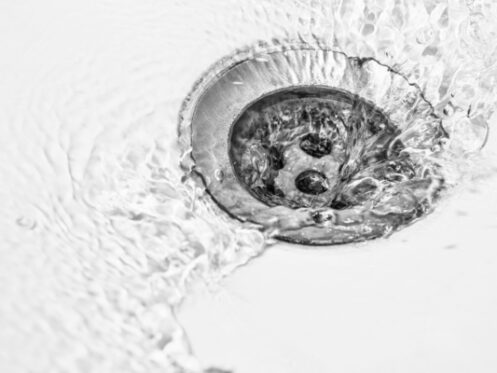Chemical drain cleaners are a popular solution for clearing clogged drains. They are readily available at most hardware and home improvement stores and can be used to clear clogs in sinks, toilets, and shower drains. However, while they may seem like an easy and effective solution, it is important to understand their potential effects on your home plumbing.
Types of Chemical Drain Cleaners
Chemical drain cleaners come in two main types: acid-based and alkaline-based. Acid-based cleaners use sulfuric acid to dissolve clogs, while alkaline-based cleaners use caustic soda (sodium hydroxide) to break down clogs. Both cleaners can effectively clear clogs but have different strengths and weaknesses.
Acid-based cleaners are typically more effective at dissolving clogs made of hair, grease, and other organic materials. However, they can cause damage to pipes and fixtures made of metal, such as copper or aluminum. Acid-based cleaners should also not be used on septic systems as they can disrupt the balance of bacteria needed to break down waste. Alkaline-based cleaners are less harsh on metal pipes and fixtures but are not as effective at dissolving clogs made of organic materials. They are also not recommended for use on septic systems.
How Chemical Drain Cleaners Work
Chemical drain cleaners work by breaking down the materials that are causing the clog. Acid-based cleaners use sulfuric acid to dissolve organic materials such as hair and grease. Alkaline-based cleaners use caustic soda to break down clogs by neutralizing acidic substances and dissolving grease and soap scum.
The chemicals in drain cleaners are typically liquid and should be poured down the drain. As the chemicals come into contact with the clog, they break it down. The chemicals can also help to loosen any debris that is stuck to the sides of the pipes.
Potential Impacts of Chemical Drain Cleaners on Home Plumbing
Here is how chemical drain cleaners can affect your home’s plumbing system.
Corrosion, Pipe Damage, and Pipe Expansion
Chemical drain cleaners are highly corrosive and can cause damage to various parts of your home plumbing system. The chemicals in these cleaners can eat away at the metal pipes, causing them to rust and weaken, eventually leading to a leak or burst. They can also damage plastic pipes, causing them to crack and break.
Additionally, the chemicals can damage the seals and gaskets in your plumbing fixtures, leading to leaks and water damage. Over time, the constant use of chemical drain cleaners can significantly damage your home plumbing system, requiring costly repairs or even replacement. These cleaners can damage pipes made of PVC or other materials, making them more vulnerable to leaks and breaks. Certain chemical drain cleaners can also cause pipes to expand, leading to potential leaks or damage.
Clogs
Another impact of chemical drain cleaners is that they can cause clogs in the pipes, leading to more frequent clogs in the future. While these cleaners may temporarily clear clogs, they can also cause buildup and blockages in the pipes.
Other chemical drain cleaners can leave behind a residue that can harden and build up over time, creating a clog. This can happen when the cleaner is not used correctly or used too frequently. Another way these chemical drain cleaners can cause clogs is by reacting with other substances in the pipes, such as grease or hair. This can happen when the cleaner is not used according to the manufacturer’s instructions.
Chemical Reactions
Chemical drain cleaners can also damage fixtures such as faucets, shower heads, and toilets, causing them to leak or malfunction. Additionally, some chemical drain cleaners can react with other chemicals present in the pipes, causing damage or discoloration. This can lead to unsightly stains or discoloration in the pipes, which can be difficult to remove.
Odors
Chemical drain cleaners are commonly used to clear clogs in pipes and drains, but they can also cause unpleasant odors in your home plumbing. This is because chemical drain cleaners contain harsh chemicals that can corrode pipes and create a buildup of bacteria and other organic matter.
When these chemicals come into contact with organic matter in the pipes, they can break it down and release an unpleasant smell. This smell can be particularly strong if the clog is located in a pipe that is not frequently used, such as a guest bathroom or a basement sink. The smell can also be more pronounced if the clog is in a vent pipe, which can cause the odor to travel throughout the house. This can be a nuisance for homeowners and can be difficult to eliminate.
Health Hazard
Chemical drain cleaners can be a significant health hazard if not used properly. The chemicals in these products can cause various health problems. One of the main health hazards associated with chemical drain cleaners is skin and eye irritation. These chemicals can cause redness, itching, and burning sensations if they come into contact with the skin or eyes. In severe cases, exposure to these chemicals can result in chemical burns and even blindness.
Respiratory issues are another significant health hazard associated with chemical drain cleaners. These chemicals can release toxic fumes when used, which can cause breathing difficulties and other respiratory problems. People with pre-existing respiratory conditions, such as asthma, are particularly at risk of experiencing these symptoms.
Chemical drain cleaners can also be harmful if ingested. These chemicals can cause damage to the digestive system, leading to nausea, vomiting, and even organ failure in severe cases. Children and pets are particularly at risk of ingesting these chemicals, so keeping them out of reach is essential.
Environmental Damage
Chemical drain cleaners contain harsh chemicals such as sulfuric acid, lye, and hydrochloric acid that can cause damage to the environment when used in excess or not disposed of properly. These chemicals can leach into soil and groundwater, contaminating water sources and causing harm to plants and animals.
Septic Contamination
Chemical drain cleaners can contaminate a septic system by disrupting the balance of bacteria in the septic tank responsible for breaking down waste. These chemicals can also damage the tank and leach field, potentially causing leaks and other issues.
Additionally, if a large amount of drain cleaner is poured down the drain, it can overload the septic system, causing it to fail. If a septic system is not functioning properly, it can contaminate the surrounding soil and groundwater with harmful bacteria and chemicals.
Contact a Professional Drain Cleaner
If you have a clog, it’s best to call a professional plumber to assess the issue and make recommendations for how to fix it. At Huft Home Services, we provide a wide range of repairs and home maintenance services, like repairing leaks, unclogging drains, and installing new fixtures, electrical services, and heating and cooling services to homeowners in Sacramento and the surrounding areas. We’ve proudly served the community since 2004, and we focus on creating lifetime loyal clients through honest work and reliable services. Call us today to book an appointment.



